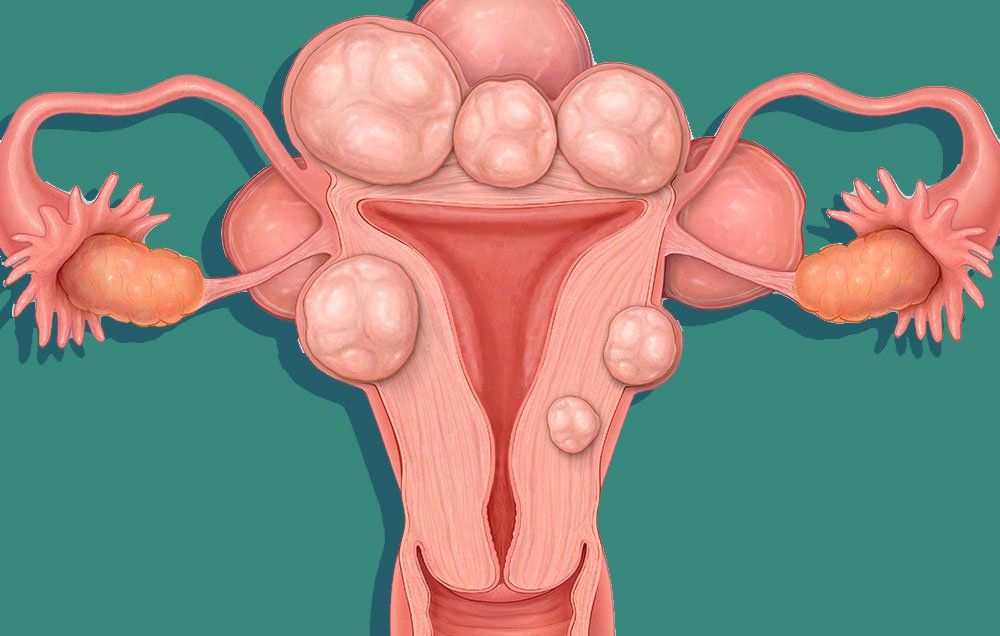The human body has striated muscles and smooth muscles. For example, the muscles of the limbs and heart related to movement are striated (attached to the skeleton), and the muscles of the stomach, esophagus, and internal organs are smooth (observed in internal organs). Hence, a benign tumor that is developed in the smooth muscle is called a leiomyoma.
The muscles of the uterus are made of smooth muscle. Uterine leiomyomas UL (fibroids) are the most common human tumor, diagnosed in one in three women over 30s. Most women with UL are asymptomatic. However, typically 20% of patients with UL suffer. From the poor quality of life with symptoms such as abnormal uterine bleeding, pelvic pain, frequent urination, and infertility. The etiology remains unknown. However, genetic factors, cytokines, growth factors, steroid hormones (estrogens and progestogens), their receptors, and excessive extracellular matrix (ECM) production play an important role. Unfortunately, most treatments provide only temporary benefits. Though postoperative complications can be alleviated with conventional therapies, treatment costs are substantial.
On the other hand, there is a positive solution through Fucoidan. It has various biological activities, including anticoagulant, antioxidant, immunomodulatory, anti-inflammatory, antibacterial activity, and anti-obesity properties, and no side effects. However, no studies have reported a relationship between UL and Fucoidan.
Thus, in this blog, I would like to introduce the study, “Fucoidan Inhibits the Proliferation of investigating the inhibitory effect of Fucoidan on UL growth” by Hsin-Yuan Chen investigated the inhibitory effect of Fucoidan on UL growth.
First, ELT-3 (Eker rat leiomyoma tumor-derived cells) and HUtSMC (human uterine smooth muscle cells) were used as in vitro models. The aim was to investigate the inhibitory effect of Fucoidan on UL growth both in ELT-3 cells and in a mouse xenograft model. According to the result, Fucoidan had shown potential benefits in inhibiting the growth of leiomyoma cells via decreasing ECM accumulation in vitro and in vivo.
To evaluate the cytotoxic effect of Fucoidan, ELT-3 was treated with Fucoidan (0, 0.1, 0.25, 0.5, 1 mg/ml) for 24 and 48 hours, and cell viability was measured using MTT assay. Fucoidan reduced the proliferation of uterine leiomyoma cells in a time-dependent manner. (See Fig.1E) Based on the above results, 0.5 mg/ml fucoidan was selected as the concentration for subsequent experiments. They also tested the inhibitory effect on cell viability by colony formation assay. The colony-forming number of ELT-3 was significantly decreased after fucoidan treatment compared to the control for five days.
The histopathological analysis of the fucoidan-treated (50 mg/kg) group showed lower expression of fibronectin and α-SMA in ELT-3-LUC xenograft mice compared with the control group in vivo. Additionally, in vitro experiments confirmed that Fucoidan abrogated TGFβ3-induced protein expression of fibronectin, α-SMA, and COL1A1 in ELT-3 cells compared with controls. (See Figure 2A-E)
In addition to the study of Nierth-Simpson EN et al., 17β-estradiol (E2) exposure rapidly activates ERK1/2 in leiomyoma cells but not in normal myometrium, suggesting that aberrant ERK1/2 signaling occurs in leiomyomas. The study demonstrated that TGFβ3 binds to TβR2, increasing phosphorylated Smad2 and ERK1/2 levels and ultimately activating gene transcription.
In vitro demonstration done by Chong CC et al., downregulation of WNT/β-catenin signaling via inhibitors of β-catenin and TCF4 (ICAT), niclosamide, or XAV939 had antitumor effects on primary cultures of human leiomyoma cells.
In these results, they observed that fucoidan treatment reduced the levels of β-catenin in both the cytoplasm and nucleus of ELT-3 cells and eliminated the translocation of β-catenin to the nucleus induced by TGFβ3.
The study also found that Fucoidan has potential benefits in inhibiting the growth of leiomyoma cells via decreasing ECM accumulation in vitro and in vivo.
It is the first study demonstrating Fucoidan’s inhibitory potential on UL growth in vivo. Researchers believe it may encourage further studies to highlight the molecular mechanisms involving Fucoidan and UL.


Source: Cell Physiol Biochem 2018;49:1970–1986. DOI: 10.1159/000493660

Hello my father is very very ill with liver cancer I would like to no the best fucoidan can help him thanku
Hi! Michelle
You can choose fucoidan that has no additional ingredients, such as rice frower. You can buy a brown color one.
You can check the NPO Research Institute of Fucoidan, and find out what is the suitable fucoidan for your father.
How would it effect on prostate cancer for men
Has there been any studies and evaluation of it’s effectiveness
Thank you
Thank you for your inquiry. According to the study, “The Anticancer Effect of Fucoidan in PC-3 Prostate
Cancer Cells” by Hye-Jin Boo et al., Fucoidan induced the apoptosis of PC-3 cells by activating both intrinsic and extrinsic pathways, which means that Fucoidan leads to prostate cancer cells to programmed cell death.